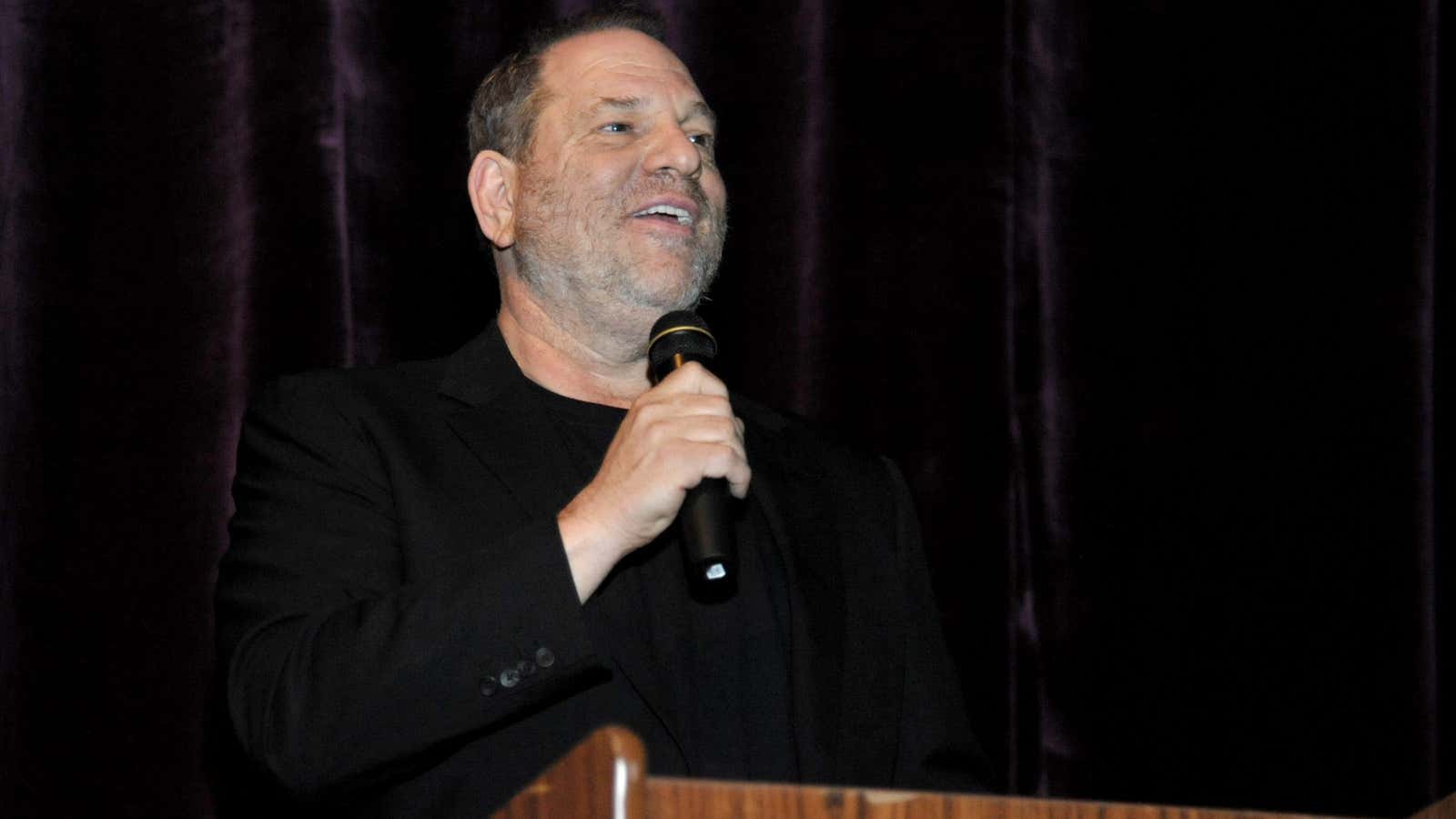Miramax co-founder Harvey Weinstein appears to be the ultimate cliché. The 65-year-old Hollywood producer faces three decades’ worth of sexual harassment allegations from former colleagues, employees, and acquaintances, a New York Times investigation (paywall) reported this week. Even more women have since come forward to share their own deeply troubling encounters with Weinstein.
The allegations are extremely disturbing—but it’s hard to call them shocking. Women know this trope well: The successful predator who uses his status as a shield from the consequences of his behavior. What is new here is not Weinstein’s abuse of power, but that women are increasingly going public with collective allegations against powerful men.
Weinstein joins a long list of high-profile men whose predatory behavior has been exposed by a group of women, including Donald Trump, Bill Cosby, Roger Ailes, Bill O’Reilly, and Silicon Valley investor-entrepreneurs Dave McClure and Chris Sacca. In each case, women came forward collectively to highlight a pattern of behavior.
There is strength in numbers. American society still doesn’t believe individual women who come forward to accuse men on their own—particularly when the man in question wields a great deal of influence. But the more women come forward to tell their stories, the more they establish a pattern that others can follow, pushing us toward a future in which our culture simply refuses to accept men’s predatory behavior.
In a sense, we’re about halfway toward a world in which it is just as safe and powerful to be a woman as it is to be a man. Here’s a brief outline of how we got here, and the steps that lie ahead.
1) Men harass women, and no one says anything
A society in this stage simply accepts the mistreatment of women, making no moral judgment about men’s behavior. This has been the case for much of human history across cultures, embedded in stories about the Greek gods, Ramayana characters, and Biblical teaching. There is absolutely no space for women to condemn men’s behavior—often, not even to, or among, themselves.
2) People become aware that it’s wrong for men to harass women
This is when the value system starts shifting. While it’s still expected and commonplace for men to engage in predatory behavior, large swaths of society can recognize that this behavior is condemnable. The trope of lecherous, powerful men begins to emerge. Actions once seen as characteristic of a libertine are now recognized as immoral. What was “suggestive” becomes obscene. What was funny becomes wildly inappropriate.
Awareness of men’s behavior spreads behind closed doors, through what editor and writer Helen Rosner describes as a “whisper network.” Women form informal secret societies to share information about who can be trusted and who to avoid. But society still blames women for men’s actions and holds women responsible for protecting themselves. If your boss makes an inappropriate comment about your dress, it’s your own fault for wearing it.
3) Women unite and speak up
This is our current stage. We are not in an era of particularly toxic masculinity, nor in the age of sociopath baby-men. Men like Weinstein, Cosby, Ailes, and the rest have always existed. We are in an age when they are getting outed.
While it’s utterly depressing that women have to act in a pack to take down a single male predator, it is progress that—when women are united—people are willing to listen to them. This doesn’t mean that men always face consequences for their actions. Ailes and O’Reilly lost their jobs, but got hefty payouts. Bill Cosby lost face in the industry, but avoided criminal conviction. Trump became president—over a woman, to boot. Men, all too often, are still getting away with sexual harassment and assault. But at the very least, they are facing judgment not just from women, but from men. The values of society are shifting.
4) Society takes steps to protect individual women, too
If the trend continues in this direction—and it will, the patriarchy be damned—a moment will soon come when an individual woman will be able to accuse a man who assaulted her without fear that she will be shamed or dismissed. Investigations will treat the word of a woman as carrying equal weight to the word of a man. If a man is found responsible, he will face consequences for his actions. A public mea culpa will not be enough. No sympathy will be given to men who promise they are trying to be better and learn from their mistakes. In this way, society will send a clear message that it is unwilling to tolerate predatory behavior.
5) Men stop sexually harassing women
A society in this stage has advanced to the point where men, as a group, do not harass women. This does not mean sexual harassment will be eliminated altogether. But men will know they can’t get away with it, and by and large, they won’t want to. Like stealing another person’s money or burning down another person’s house, predatory behavior against women will be widely understood as immoral, despicable, and profoundly unacceptable.
The upshot
This prediction may seem utopian at a time when women’s rights are consistently threatened, and when stories of men assaulting or attacking women chase one another out of the news cycle. But it’s not. We’re on the cusp of a social change. Thanks to the bravery of women coming forward to accuse their harassers, we’re three-fifths of the way there, and the worst is solidly behind us.
